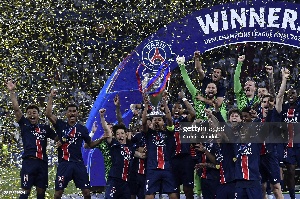Business News of Friday, 23 May 2025
Source: www.ghanawebbers.com
The strategic case for a Ghana Food-Security Bond.
Ghana's current food system is fragile. Good harvests alone are not enough. We need better storage, distribution, and preparation for shocks.
To address this, Ghana requires long-term financing. This financing must be intelligent and accountable. It should help us prepare for disruptions before they happen.
The Ghana Food-Security Bond offers a structured way to raise funds now. This bond aims to build a sustainable food system for future generations.
What is a Food-Security Bond?
A Food-Security Bond is a government-backed financial tool. It allows the government to borrow money from investors. The promise is that these funds will strengthen our ability to feed ourselves.
Think of it as a loan for building food security infrastructure. Unlike regular borrowing, this money is ring-fenced. It can only be used for specific investments in the food system.
These investments include irrigation systems, local fertiliser production, and food storage upgrades. The bond treats food security like physical infrastructure, making it measurable and attractive to investors.
Capital is raised upfront by selling bonds to banks and pension funds. Funds are tied to clear outcomes like reducing waste or stabilising prices. Repayment occurs gradually through tax revenues or international support.
This bond represents a serious commitment backed by law and performance tracking. Its goal is simple: ensure that everyone can afford to eat.
What Would the Bond Fund?
The Food-Security Bond would focus on specific issues in Ghana’s food system. Here are key areas it would finance:
1. Agro-Rings Infrastructure: These zones around cities bring food closer to people.
2. Digital Traceability Tools: Technology tracks food from farm to fork.
3. Access to Fertilisers and Seeds: Pre-financing helps farmers get quality inputs on time.
4. Expanding Buffer Stocks: Modern warehouses ensure proper storage of grains.
5. Nutrition-Linked Interventions: Funding school meals and local fortification combats malnutrition.
Each area has practical impacts, leading to better-fed children and stronger farms.
Why Ghana Is Ready
Ghana has strong institutions supporting national strategies for food security:
- Ghana Commodity Exchange (GCX): A marketplace ensuring fair prices for farmers.
- Buffer Stock Company: Stabilises availability and prices of food.
- Green Bonds: Previous successful bonds show investor trust in Ghana’s management.
- Development Bank Ghana (DBG): Provides long-term finance specifically for agriculture.
These institutions form the foundation needed for coordinated efforts toward long-term food security.
A Food-Security Bond would complement existing programs without replacing them. It brings new capital while promoting accountability in investments vital for the future.
Does Ghana Have a Food-Security Bond?
Ghana hasn’t launched an official Food-Security Bond yet but is prepared for one. The country has been building necessary financial structures through various initiatives.
Programs like the West Africa Food System Resilience Programme aim at strengthening our systems against climate change impacts.
Additionally, frameworks have been established for sustainable investment in agriculture, guiding where funds can make an impact effectively.
The groundwork exists; we just need a dedicated bond to connect these efforts into one strategy focused on resilience and sustainability.
Potential of a Dedicated Food-Security Bond
While not officially issued yet, steps have been taken towards creating such a bond in Ghana:
Participation in regional programs shows commitment to agricultural stability.
Successful issuance of green bonds indicates institutional capacity and investor confidence exists already.
With political will and stakeholder engagement aligned, Ghana could lead Africa with this initiative that feeds its future sustainably.
Who Would Lead This Initiative?
Several existing organizations would manage the Food-Security Bond:
- Ministry of Finance: Designs the bond and manages funds responsibly.
- Ministry of Food and Agriculture: Determines fund allocation areas based on expertise.
- GCX & Buffer Stock Company: Regulate buying, storing, transporting foods across the country.
- Ghana Statistical Service & CSIR: Evaluate effectiveness using data monitoring methods.
- Private Sector & Development Partners: Provide innovative services while ensuring public interest remains central.
Coordination among these groups ensures effective implementation towards long-term goals.
Why Investors Would Care
Investors seek opportunities blending financial returns with real-world impact:
1. Strong starting point: Successful past bonds show capability in managing finances well.
2. Clear risks: Addressing food insecurity fosters economic stability sought by investors.
3. Local support: Institutions can invest locally while earning returns simultaneously.
4. Global interest: Many investors look for products linked with UN Sustainable Development Goals (SDGs).
5. Performance-based returns: Bonds may offer bonuses if specific goals are achieved.
This isn’t charity; it’s structured investment transforming measurable assets into something valuable.
Challenges Ahead
For success with the bond, several challenges must be addressed:
1. Clear KPIs: Specific outcomes must be agreed upon beforehand—like reducing malnutrition rates or increasing storage capacity.
2 Governance must be robust: Strong controls prevent misuse of funds through audits and transparency measures.
3 Public support needs cultivation: Ghanaians must see how this benefits their families directly.
4 Policy discipline must remain intact: Legal safeguards protect against political interference over time.
5 Continuity matters: Long-term planning ensures lasting impacts beyond election cycles.
Addressing these challenges sets standards for tackling complex national issues effectively moving forward.
In conclusion, every nation should provide sufficient nutritious food as a basic function.
Ghana possesses significant potential with fertile land and diligent farmers but lacks necessary frameworks connecting them effectively.
A Food-Security Bond provides that framework by backing good ideas financially.
It transforms scattered efforts into coordinated strategies addressing hunger proactively rather than reactively.
Let’s act now! Let’s build systems making hunger less likely while mobilizing necessary funding together!
Let’s feed Ghana purposefully—with pride—for God and Country! ????????











